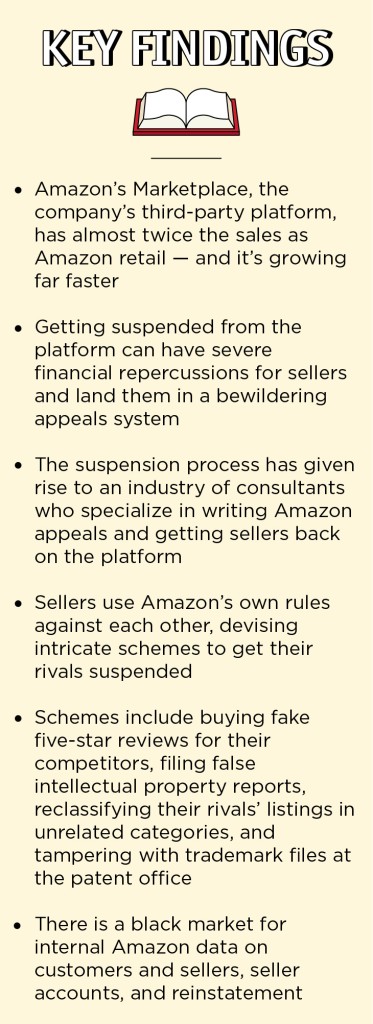A rival had framed Plansky for buying five-star reviews, a high crime in the world of Amazon. The funds in his account were immediately frozen, and his listings were shut down. Getting his store back would take him on a surreal weeks-long journey through Amazon’s bureaucracy, one that began with the click of a button at the bottom of his suspension message that read “appeal decision.”
When you buy something on Amazon, the odds are, you aren’t buying it from Amazon at all. Plansky is one of 6 million sellers on Amazon Marketplace, the company’s third-party platform. They are largely hidden from customers, but behind any item for sale, there could be dozens of sellers, all competing for your click. This year, Marketplace sales were almost double those of Amazon retail itself, according to Marketplace Pulse, making the seller platform alone the largest e-commerce business in the US.
For sellers, Amazon is a quasi-state. They rely on its infrastructure — its warehouses, shipping network, financial systems, and portal to millions of customers — and pay taxes in the form of fees. They also live in terror of its rules, which often change and are harshly enforced. A cryptic email like the one Plansky received can send a seller’s business into bankruptcy, with few avenues for appeal.
Sellers are more worried about a case being opened on Amazon than in actual court, says Dave Bryant, an Amazon seller and blogger. Amazon’s judgment is swifter and less predictable, and now that the company controls nearly half of the online retail market in the US, its rulings can instantly determine the success or failure of your business, he says. “Amazon is the judge, the jury, and the executioner.”

Amazon is far from the only tech company that, having annexed a vast sphere of human activity, finds itself in the position of having to govern it. But Amazon is the only platform that has a $175 billion prize pool tempting people to game it, and the company must constantly implement new rules and penalties, which in turn, become tools for new abuses, which require yet more rules to police. The evolution of its moderation system has been hyper-charged. While Mark Zuckerberg mused recently that Facebook might need an analog to the Supreme Court to adjudicate disputes and hear appeals, Amazon already has something like a judicial system — one that is secretive, volatile, and often terrifying.
Amazon’s judgments are so severe that its own rules have become the ultimate weapon in the constant warfare of Marketplace. Sellers devise all manner of intricate schemes to frame their rivals, as Plansky experienced. They impersonate, copy, deceive, threaten, sabotage, and even bribe Amazon employees for information on their competitors.
And what’s a seller to do when they end up in Amazon court? They can turn to someone like Cynthia Stine, who is part of a growing industry of consultants who help sellers navigate the ruthless world of Marketplace and the byzantine rules by which Amazon governs it. They are like lawyers, only their legal code is the Amazon Terms of Service, their court is a secretive and semiautomated corporate bureaucracy, and their jurisdiction is an algorithmically policed global bazaar rife with devious plots to hijack listings for novelty socks and plastic watches. People like Stine are fixers, guides to the cutthroat land of Amazon, who are willing to give their assistance to the desperate — for a price, of course.
Read the complete article of The Verge here.
